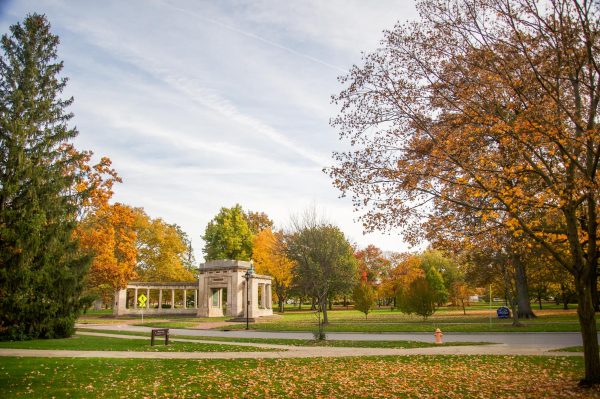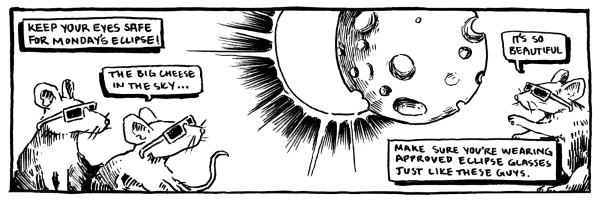A Wandering Jew Goes to Washington
It all began rather inconspicuously. In fact, at the height of the holiday season, the way it was announced seemed almost like a gift. It was as if the stubbornness of President Trump squeezed its way down the chimney, crept through the house, and placed the government shutdown gently at the base of the tree. Federal workers who work so hard throughout the year usually only get a handful of free vacation days. Quite honestly, they deserved a break.
And sure, they suffered a slight sting at the reminder that they weren’t an “essential,” part of the Federal Government but it would have stung even more to have used up all their vacation days just to travel back to the town where they went to high school, engage in painful conversations with distant relatives, and smile through their teeth as they complimented the “wonderful yule log cake.” And sure, the people on the news seemed angry or upset, but when were they not? Just like everything else in the news these days, the shutdown would pass shortly, obscured by some other ridiculous Trump-induced disaster. By January, the everyday life of a federal worker would resume as scheduled.
We were so innocent then. Before the record-long thirty-five day shutdown during which the government had lost around $11 billion, some 800,000 federal employees had missed two paychecks, and contractors and small businesses supported by federal workers had taken a devastating month-long hit to their finances.
Those are the hard facts. But the shutdown was a whirlwind of nuanced lessons. So what exactly happened over those 35 days? How did the workers get through the month without a paycheck? And, most immediate to me , what was I going to do with my first winter term now that I had been informally furloughed from my winter term internship at the Peace Corps?
I’m glad you asked.
I had spent winter break in New York, and when I arrived in late December, all talk of a shutdown was tossed at me jokingly. But when December suddenly transformed into January, I shifted from cool, calm, and collected into a complete nervous wreck. It was during one of my nervous news binges (a new habit of mine) that I heard the government shutdown might last weeks — perhaps until Jan. 29 — the State of the Union and the last day of Winter Term.
So, the next day I sent a frenzied barrage of emails to Oberlin’s Office of Winter Term. Of course, the office, unfazed by a nervous first-year, comforted me and offered me a few options. I could either change my project or drop the project altogether (there’s always next year!). I had until the Jan. 14 to make a decision. As someone who had only recently become accustomed to independence, I needed all the time I could get. And while I switched back and forth between abandoning and changing my project, I realized I was in a rather interesting position. So, carried by my vision of being a young, groundbreaking investigative journalist, I set out to learn more about that very situation and took the earliest train I could from New York to D.C. My plan was simple: research the current shutdown and its place in history, interview federal workers, and write.
On my first day in D.C. I found myself standing outside the White House, looking for signs of trouble. It was a beautiful, snowy day, and as several small tourist groups milled about, it seemed idyllic. If it weren’t for the news, no one would have known that a fire raged inside.
Of course the lack of protestors was news as well. What it revealed exactly is hard to say, but it was clear that federal workers were not gathering in protest at the White House. Maybe they were all working other jobs — it was a Tuesday after all. Maybe people had lost their sense of rage and were coming to terms with the reality of unemployment, or maybe they were actually fine with getting the time off.
It was interesting to be in limbo with these workers as well, and I tried to document visible signs of these uncertain times. I took a few different pictures of the barren landscape of Washington. People were staying off the streets. Rush hour seemed light. I found a few huge groups of students on class trips wandering the city, undoubtedly having changed their plans since most of the monuments and museums were closed for the shutdown.
It was shortly after these early adventures in DC that I received a call from my grandmother in which we discussed my recent travels and change in plans. “You’re like the Wandering Jew,” she said. Being unfamiliar with the extended Jewish cinematic universe, a bit more research was required to understand the reference. A quick Google search turned Wikipedia entry would reveal that “The Wandering Jew” was “a Jew who was cursed to walk the earth until the Second Coming.” This was a bit more dire than my interpretation of my current situation. Rather, I thought of myself more as the schlimazel to Trump’s schlemiel -— the unsuspecting victim of a clumsily spilled cup of boiling hot government shutdown soup.
Throughout this time, I gathered accounts from federal workers whose lives had been affected by the shutdown. One issue stood out in particular: morale. While pay is a serious issue for furloughed and excepted employees, all employees receive back pay once the government reopens. Both of these types of employees did not receive a paycheck this month, but while furloughed employees were essentially “laid off” for the month and thus had the option to explore other opportunities to earn income, excepted employees had to continue to work their government jobs as normal — just without pay. While money would eventually be paid back, something that cannot be paid back is faith. The workforce fractured along various lines, often resulting in feelings of resentment or insecurity. Unlike the more upsetting accounts on the news, many of the workers I spoke with had some level of financial security. They could manage the economic hit, though it may mean being more frugal or creative with spending. They loved the work they did, but their confidence in leadership was deeply shaken, and they too began to question whether they — as well as their work — were truly essential.
My last day in D.C. was another example of my “lucky” streak. As I boarded a plane to St. Louis, I received an alert that a massive group of federal workers had gathered to protest the shutdown in D.C. — the exact type of gathering I had been looking for everyday I had spent there. And while I had so expertly calculated that an agreement would not be reached on the Thursday Senate vote, I had not foreseen the arrest of Roger Stone and subsequent “coincidental” reopening of the government by Donald Trump on Saturday, which would have given me two days to see the return of the workers to the Peace Corps. Instead, I spent the days writing about the rest of the world in Missouri.
On the last day of winter term, Jan. 29, the day of what would have been the State of the Union, I received this email:
“Dear Justin Pelofsky, Welcome to the Peace Corps team! It is a pleasure to confirm you have been cleared by Peace Corps Safety and Security, and are now ready to come onboard as an Intern.”
Keep me in mind for next year, Peace Corps. Maybe by then the Democrats will realize that good fences, or walls, or steel slats, or whatever you want to call them, actually do make good neighbors.




